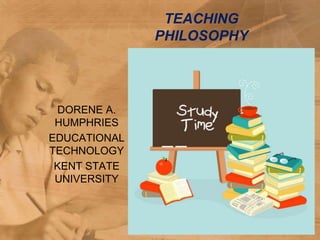
Teaching philosophy
- 1. TEACHING PHILOSOPHY DORENE A. HUMPHRIES EDUCATIONAL TECHNOLOGY KENT STATE UNIVERSITY
- 2. OBJECTIVES OF TEACHING Independence to the best of his or her ability using critical thinking, using life-long learning skills. Mastery of self-help skills, independent living skills, communication skills. Success in his or her way of learning. Skillfulness in the concepts being taught. Flexibility in using new ways to learn as he or she matures.
- 3. METHODS OF REACHING THESE OBJECTIVES Critical thinking: 1. teach the child, to the best of his/her ability, to think about tasks in more than one Collaborative learning way. 1. tailored to his or her 2. explore various answers way of learning. instead of just one, and 2. cross-peer tutoring. 3. if the student can 3. mentoring. communicate it in any way, 4. scaffolding: to assist have them ask questions – one him or her to obtain can use ASL, PECs and skillfulness in the skill writing or drawing as well as being taught. speech. 5. flexibility: open to Lifetime skills: new methods of 1. make goals and objectives for teaching individuals the child, using subgoals, and with special needs to 2. involve all professionals and help them reach their parents in the planning. personal goals.
- 4. MEASURING EFFECTIVENESS OF REACHING THESE OBJECTIVES Build in goals and objectives for lifelong learning skills, self-help skills, independent living skills, communication skills, and assess how the student is doing on these periodically. Have tutors and mentors keep a record of how the student is meeting goals in their areas. Keep track of how the student is progressing to higher levels through scaffolding. Assess how well the new methods are working and decide how long to attempt new methods before trying something else.
- 5. WHY TEACHING IS IMPORTANT TO ME Learning as I teach, and teaching as I learn Learning more on how to approach teaching and guiding individuals with special needs. Learning formal teaching methods, their names, their assessment routines, and their validity, I am eager to test these methods.
